高三英语一轮知识点
- 格式:doc
- 大小:402.00 KB
- 文档页数:110
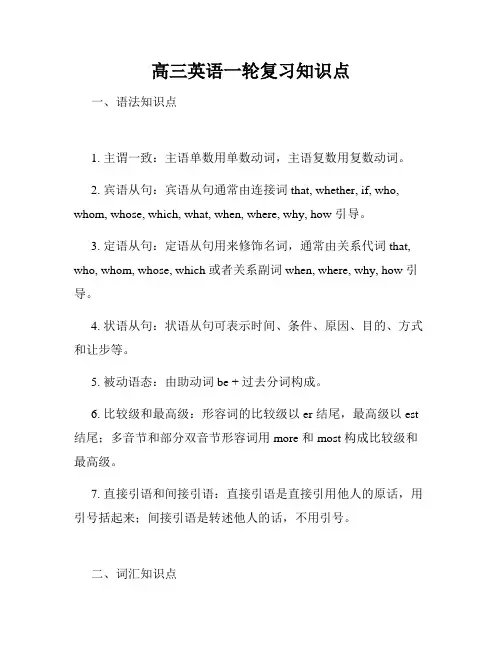
高三英语一轮复习知识点一、语法知识点1. 主谓一致:主语单数用单数动词,主语复数用复数动词。
2. 宾语从句:宾语从句通常由连接词 that, whether, if, who, whom, whose, which, what, when, where, why, how 引导。
3. 定语从句:定语从句用来修饰名词,通常由关系代词 that, who, whom, whose, which 或者关系副词 when, where, why, how 引导。
4. 状语从句:状语从句可表示时间、条件、原因、目的、方式和让步等。
5. 被动语态:由助动词 be + 过去分词构成。
6. 比较级和最高级:形容词的比较级以 er 结尾,最高级以 est 结尾;多音节和部分双音节形容词用 more 和 most 构成比较级和最高级。
7. 直接引语和间接引语:直接引语是直接引用他人的原话,用引号括起来;间接引语是转述他人的话,不用引号。
二、词汇知识点1. 同义词和反义词:同义词是指意义相同或相近的词,反义词是指意义相对立的词。
2. 词组搭配:学习词汇时,要注意词组的固定搭配,即两个或多个词一起使用时的特定搭配方式。
3. 词性转换:词性转换是指一个词在不同的语境中可以根据需要变化其词性,如名词变动词、形容词变副词等。
4. 前缀和后缀:前缀是指加在词根前面的词缀,后缀是指加在词根后面的词缀。
三、阅读理解知识点1. 主旨大意题:主要考察对文章的整体概括和把握能力。
2. 细节理解题:要求学生对文章进行深入细致的分析和理解。
3. 推理判断题:要求学生根据文章的暗示或者提供的信息进行推断。
4. 逻辑推理题:要求学生根据已知条件进行推理,推断出结果或者逻辑关系。
5. 修辞手法题:考察学生对文章修辞手法和修辞效果的理解和分析能力。
四、写作知识点1. 时态:使用一般现在时、一般过去时、一般将来时、现在进行时、过去进行时、过去完成时等。
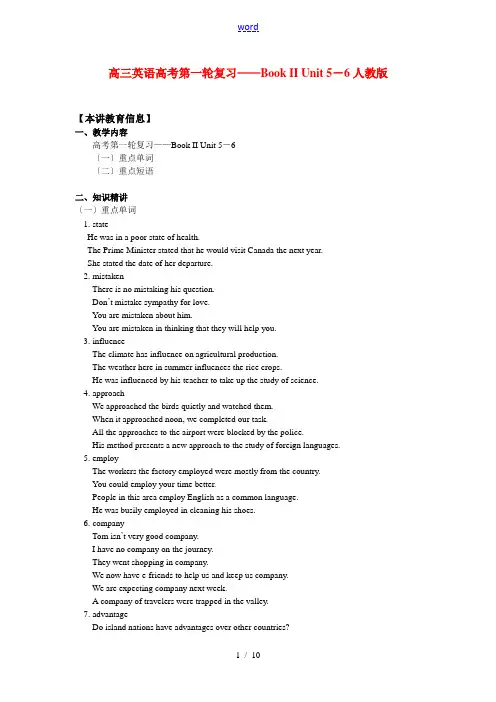
高三英语高考第一轮复习——Book II Unit 5-6人教版【本讲教育信息】一、教学内容高考第一轮复习——Book II Unit 5-6〔一〕重点单词〔二〕重点短语二、知识精讲〔一〕重点单词1. stateHe was in a poor state of health.The Prime Minister stated that he would visit Canada the next year.She stated the date of her departure.2. mistakenThere is no mistaking his question.Don’t mistake sympathy for love.You are mistaken about him.You are mistaken in thinking that they will help you.3. influenceThe climate has influence on agricultural production.The weather here in summer influences the rice crops.He was influenced by his teacher to take up the study of science.4. approachWe approached the birds quietly and watched them.When it approached noon, we completed our task.All the approaches to the airport were blocked by the police.His method presents a new approach to the study of foreign languages.5. employThe workers the factory employed were mostly from the country.You could employ your time better.People in this area employ English as a common language.He was busily employed in cleaning his shoes.6. companyTom isn’t very good company.I have no company on the journey.They went shopping in company.We now have e-friends to help us and keep us company.We are expecting company next week.A company of travelers were trapped in the valley.7. advantageDo island nations have advantages over other countries?You should take advantage of all educational opportunities. It’ll be to your advantage to study abroad.8. ensureen- 动词前缀,“使处于……状态〞rich-enrichlarge-enlargeable-enablejoy-enjoycourage-encouragedanger-endangerThese pills should ensure you a good night sleep.Please ensure that all the lights are switched off at night.9. remainThere remain only a few ruins that remind us of the old days. The children ate and ate until no food remained on the table. How long will you remain here?After the party Mary remained and helped me do the dishes. Though they sometimes disagree, they remain good friends. The weather still remained cold in April.The meeting was over, but the problem remained unsolved. After the flood, no house in the village remained standing.It remains to be seen whether he will pass.Nothing remained to be said.Much remained to be done.10. cheatHe was cheated out of his proper reward.The salesman cheated him into buying a fake.Never cheat in exams.11. requireThe task requires good attention.They required me to appear at once.All the members were required to attend the meeting.The grass requires cutting.They required that I (should) go at once.12. dealThe man is hard to deal with.How will you deal with the problem?—You pay for the supper and I will treat you to a movie. OK? —It’s a deal.13. narrowa narrow patha narrow facea narrow viewa narrow-minded persona narrow escapea narrow victorya narrow defeatHe narrowed his eyes.〔二〕重点短语1. consist ofThe Group of Eight (G8) consists of the eight richest countries in the world.Coal consists mostly of carbon.2. make the most ofmake good/full use ofmake the best of3. judge… from/by…Never judge a person by/from his appearance.Judging from/by what he said, he must be an honest man.4. as it is5. at one pointAt one point in the meeting she nearly lost her temper.6. catch a glimpse of7. in storeHe always keeps several cases of beer in store.I can see trouble in store.There is a surprise in store for you.8. in general9. bear fruit and grain10. and yetHe failed again, and yet he wasn’t discouraged.三、高考聚焦1. The top leaders of the two countries are holding talks in a friendly ______.A. atmosphereB. stateC. situationD. phenomenon2. American Indians ___ about five percent of the U.S. population.A fill up B. bring up C. make up D. set up3. At the meeting they discussed three different ____ to the study of mathematics.A. approachesB. meansC. methodsD. ways4. The final score of the basketball match was 93-94. We were only ____beaten.A. nearlyB. slightlyC. narrowlyD. lightly5. It is said that dogs will keep you ____ for as long as you want when you are feeling ____.A. safety, aloneB. company, lonelyC. house, lonelyD. friend, alone6. Having a trip abroad is certainly good for the couple, but it remains ___ whether they’ll enjoy it.A. to seeB. to be seenC. seeingD. seen7. Why don’t you put the meat in the fridge? It will ____ fresh for several days.A. be stayedB. stayC. be stayingD. have stayed8. The pilot asked all the passengers on board to remain ___ as the plane was making a landing.A. seatB. seatingC. seatedD. to be seating9. It was already past midnight and only three young men ___ in the tea house.A. leftB. remainedC. delayedD. deserted10. It remains _____ whether Jim will be fit enough to play in the finals.A. seenB. to be seenC. seeingD. to see11. Please remain ____ until the plane has come to a complete stop.A. seatB. to be seatedC. seatingD. seated12. When she first arrived in China, she wondered what the future might have_________for her, but now all her worries are gone.A. in needB. in timeC. in preparationD. in store13. As a matter of fact, we do meet now and then, but not _____.A. regularlyB. actuallyC. graduallyD. normally14. a certain doubt among the people as to the practical value of the project.A. It hasB. They haveC. It remainsD. There remains15. The little girl who got lost decided to remain _________she was and wait for her mother.A. whereB. whatC. howD. who16. Ladies and gentlemen, please remain __________ until the plane has come to a complete stop.A. seatedB. seatingC. to seatD. seat17. Please remain______; the winner of the prize will be announced soon.A. seatingB. seatedC. to seatD. to be seated答案:ACACB BBCBB DDADA ABUnit7—8预习导学1. 背诵Unit7—8的单词、短语,重点预习以下知识点:1) persuade2) recover的多种意思3) tip的多种意思4) count5) live with以与live的词组2. what的一些特殊疑问句3. 预习虚拟条件句,试完成以下习题:1) I would have told him the answer had it been possible, but I _____ so busy then.A. had beenB. wereC. wasD. would be2) If she could sew, _____.A. she make a dressB. she would have made a shirtC. she will make a shirtD. she would had made a coat3) _____ today, he would get there by Friday.A. Would he leaveB. Was he leavingC. Were he to leaveD. If he leaves【模拟试题】〔答题时间:55分钟〕一、语音1. captainA. mountainB. trainC. nailD. certain2. clothesA. monthsB. mouthsC. pathsD. lengths3. vastA. saltyB. balloonC. fastenD. camera4. cubicA. squidB. pullC. gunD. huge5. constructionA. pilotB. dozenC. voyageD. globe6. homelandA. islandB. accidentC. encourageD. astonishing7. otherwiseA. senseB. prisonerC. preciousD. conversation8. powderA. blowB. shadowC. proudD. countryside9. batheA. bathB. depthC. thirstD. altogether10. coffeeA. dinnerB. deedC. dreamD. cheese二、单项选择1. Since we can’t find a more proper word, let’s leave it it is.A. asB. whereC. whatD. how2. Many people hold the view that men are born to have over women in work.A. advantagesB. no advantagesC. not advantageD. advantage3. My problem right now is I should have someone else take the place of me.A. ifB. whetherC. whichD. what4. There was a look on his face when he faced so many roads in front of him.A. confusingB. confusedC. confuseD. confusedly5. Cape Verde is an African country, 10 main islands and 5 tiny ones.A. consisting ofB. made upC. includedD. making up6. All finished, we sat down to enjoy we thought was the most delicious dinner.A. thatB. whatC. whichD. it7. They studied very hard in the belief they could serve the people with their knowledge.A. whatB. thatC. whoD. which8. Don’t be by what he says. Instead, you should act on your own judgement.A. fooledB. movedC. changedD. influenced9. I got caught in the rain and my suit .A. has ruinedB. had ruinedC. has been ruinedD. had been ruined10. —It was really very kind of you to give me a lift home.—Oh, don’t mention it. I past your house anyway.A. was comingB. will comeC. had comeD. have come11. If Newton lived today, he would be surprised by what in science and technology.A. had discoveredB. had been discoveredC. has discoveredD. has been discovered12. —Did you tidy your room?—No, I was going to tidy my room but I visitors.A. hadB. haveC. have hadD. will have13. Beijing plans to control number of vehicles on the road to ensure clean air for2008 Olympic Games.A. a; 不填B. a; theC. the; 不填D. the; the14. —She will, , get into trouble.—I agree. I hope she will get rid of her bad habits.A. more or lessB. here and thereC. sooner or laterD. just so-so15. the safety of gas, the government has checked the city’s gas supply system thoroughly.A. To ensureB. EnsuringC. Having ensuredD. To have ensured16. The crowd cheered wildly at the of Liu Xiang, who was reported the world record in the 110-meter hurdle race.A. glimpse; breakingB. sight; having brokenC. sight; to have brokenD. glimpse; break17. He has got accustomed to the matters that I don’t know .A. dealing with; what to do with themB. dealing with; how to deal withC. do with; what to do withD. do with; how to deal with them18. —It’s that all the people will be present at the meeting.—Don’t be so .A. certain; sureB. certain; surelyC. sure; sureD. sure; certain19. How do you it and what should I it?A. deal with; deal withB. deal with; do withC. do with; deal withD. do with; do with20. Besides water, wind, we must save electricity as a sort of .A. energyB. powerC. industryD. wealth21. The electricity was cut off because of the storm. Luckily we had plenty of candles store.A. inB. atC. forD. with22. To the child’s quick recovery, five doctors took turns looking after him day and night.A. ensureB. undertakeC. promiseD. indicate23. As we all know, was once truth may be true no longer.A. thereB. itC. thatD. what24. The Grand Theatre is located on one of corner of is called the people’s square.A. whichB. whatC. the placeD. where25. After Yang Liwei succeeded in circling the earth, our astronauts desire to do is walking in space.A. whereB. whatC. thatD. how26. —Our holiday cost a lot of money.—Did it? Well, that doesn’t matter you enjoyed yourselves.A. unlessB. as far asC. as long asD. until27. —If we take a plane, we’ll of course have arrived in Paris by the next weekend.—Don’t be sure, we should the weather factor. What shall we do if it is foggy?A. leave aloneB. allow forC. look overD. take advantage of三、完形After the birth of my second child, I got a job at a restaurant. Having worked with an experienced 1 for a few days, I was 2 to wait tables on my own. All went 3 went first week. When Saturday night came, I was luckily 4 the tables not for from the kitchen. 5 .I still felt it a little hard to carry the heavy trays (托盘).Before I knew it, the 6 was full of people. I moved slowly, 7 every step. I remember how 8 I was when I saw the tray stand near the tables; it looked different from the one I was 9 on. It had nice handles, which made it 10 to move around. I was pleased with every thing and began to 11 I was a natural at this job.Then, an old man came to me and said, “Excuse me, dear, my wife and I loved 12 you work. t seems your tray stand has been very 13 to you, but we are getting ready to 14 now ,and my wife needs her 15 back.〞At first his 16 did not get across. “What was he talking about!〞Then, I got it. I had set my trays on his wife’s orthopedic walker (助步器). I stood frozen as ice, but my face was17I wanted to get into a hole and 18 .Since then, I have learned from many mistakes such as the one I just 19 I have learned to be more 20 and not to be too sure of myself.1. A. manager B. assistant C. cook D. waitress2. A. promised B. invited C. allowed D. advised3. A. well B. quickly C. safely D. wrong4. A. left B. given C. brought D. shown5. A. Therefore B. However C. Otherwise D. Finally6. A. kitchen B. street C. restaurant D. table7. A. minding B. changing C. taking D. saving8. A. angry B. calm C. sad D. happy9. A. fixed B. trained C. loaded D. waited10. A. slower B. lighter C. quieter D. easier11. A. believe B. agree C. regret D. pretend12. A. letting B. making C. watching D. having13. A. useful B. familiar C. unusual D. interesting14. A. rest B. order C. eat D. leave15. A. bag B. walker C. tray D. coat16. A. idea B. praise C. message D. need17. A. cold B. full of joy C. pale D. on fire18. A. lie B. hide C. defend D. stay19. A. repeated B. discovered C. corrected D. described20. A. careful B. patient C. honest D. practical四、阅读ALast week my youngest son and I visited my father at his new home in Tucson, Arizona. He moved there a few years ago, and I was eager to see his new place and meet his friends.My earliest memories of my father are of a tall, handsome successful man devoted to his work and family, but uncomfortable with his children. As a child I loved him; as a school girl and young adult I feared him and felt bitter about him. He seemed unhappy with me unless I got straight A’s and unhappy with my boyfriends if their fathers were not as “successful〞as he was.Whenever I went out with him on weekends, I used to struggle to think up things to say, feeling on guard.On the first day of my visit, we went out with one of my father’s friends for lunch at an outdoor cafe. We walked along that afternoon, did some shopping, ate on the street table, and laughed over my son’s funny facial expressions. Gone was my father’s critical (挑剔的) air and strict rules. Who was this person I knew as my father, who seemed so friendly and interesting be around? What had held him back before?The next day my dad pulled out his childhood pictures and told me quite a few stories about his own childhood. Although our times together became easier over the years, I never felt closer to him at that moment After so many years, I’m at last seeing another side of my father. And in so doing, I’m delighted with my new friend. My dad, in his mew home in Arizona, is back to me from where he was.1. What does the author think of her father after her visit to Tucson?A. He was silent most of the time.B. He was too proud of himself.C. He did not love his children.D. He expected too much of her.*2. When the author went out with her father on weekends, she would feel .A. nervousB. sorryC. tiredD. Strict and hare-working.3. What does the author think of her father after her visit to Tucson?A. More critical.B. More talkative.C. Gentle and friendly.D. Strict and hard-working.4. The underlined words “my new friend〞in the last paragraph refer to.A. the author’s sonB. the author’s fatherC. the friend of the author’s fatherD. the café ownerBMore than 10 years ago, it was difficult to buy a tasty pineapple. The fruits that made it to the UK were green on the outside and, more often than not, hard with an unpleasant taste within. Then in 1996, the Del Monte Gold pineapple produced in Hawaii first hit our shelves.The new type of pineapple looked more yellowy-gold than green. It was slightly softer on the outside and had a lot of juice inside. But the most important thing about this new type of pineapple was that it was twice as sweet as the hit-and –miss pineapples we had known. In no time,the Del Monte Gold took the market by storm,rapidly becoming the world’s best-selling pineapple variety,and delivering natural levels of sweetness in the mouth,up until then only found in tinned pineapple.In nutrition (营养) it was all good news too.This nice-tasting pineapple contained four timesmore vitamin C(维生素C)than the old green variety.Nutritionists said that it was not only full of vitamins,but also good against some diseases.People were understandably eager to be able to buy this wonderful fruit.The new type of pineapple was selling fast,and the Del Monte Gold pineapple rapidly became a fixture in the shopping basket of the healthy eater.Seeing the growing market for its winning pineapple,Del Monte tried to keep the market to itself.But other fruit companies developed similar pineapples,Del Monte turned to law for help,but failed.Those companies argued successfully that Del Monte’s attempts to keep the golden pineapple for itself were just a way to knock them out of the market.5.We learn from the text that the new type of pineapple is ____________.A. green outside and sweet insideB. good-looking outside and soft insideC. yellowy-gold outside and hard insideD. a little soft outside and sweet inside6.Why was the new type of pineapple selling well?A. It was rich in nutrition and tasted nice.B. It was less sweet and good for health.C. It was developed by Del Monte.D. It was used as medicine.*7.The underlined word“fixture〞in Paragraph 3 probably refers to something__________.A. that people enjoy eatingB. that is always presentC. that is difficult to getD. that people use as a gift8.We learn from the last paragraph that Del Monte_____________.A. allowed other companies to develop pineapplesB. succeeded in keeping the pineapple for itselfC. tried hard to control the pineapple markerD. planned to help the other companies五、短文改错此题要求改正所给短文中的错误。
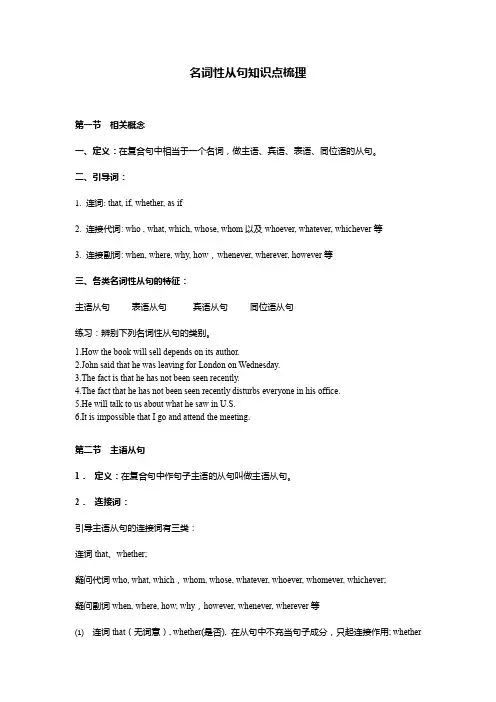
名词性从句知识点梳理第一节相关概念一、定义:在复合句中相当于一个名词,做主语、宾语、表语、同位语的从句。
二、引导词:1. 连词: that, if, whether, as if2. 连接代词: who , what, which, whose, whom以及whoever, whatever, whichever等3. 连接副词: when, where, why, how,whenever, wherever, however等三、各类名词性从句的特征:主语从句表语从句宾语从句同位语从句练习:辨别下列名词性从句的类别。
1.How the book will sell depends on its author.2.John said that he was leaving for London on Wednesday.3.The fact is that he has not been seen recently.4.The fact that he has not been seen recently disturbs everyone in his office.5.He will talk to us about what he saw in U.S.6.It is impossible that I go and attend the meeting.第二节主语从句1.定义:在复合句中作句子主语的从句叫做主语从句。
2.连接词:引导主语从句的连接词有三类:连词that、whether;疑问代词who, what, which,whom, whose, whatever, whoever, whomever, whichever;疑问副词when, where, how, why,however, whenever, wherever等⑴连词that(无词意), whether(是否), 在从句中不充当句子成分,只起连接作用; whether能引导主语从句,而if不能。

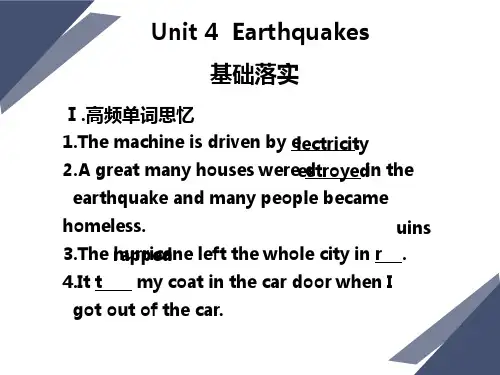
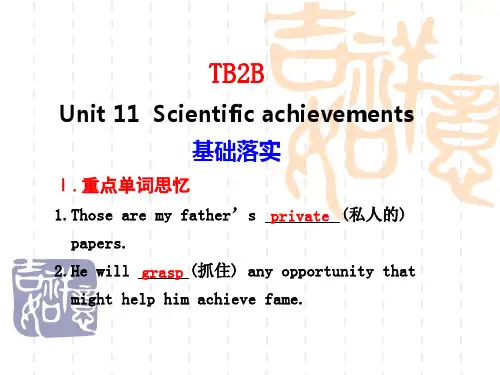
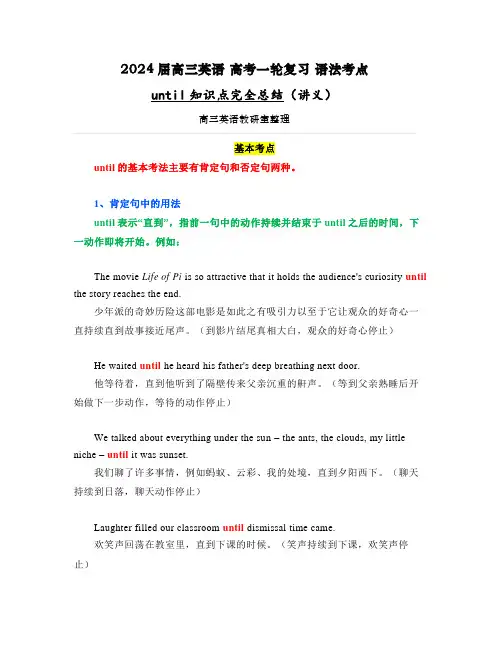
2024届高三英语高考一轮复习语法考点until知识点完全总结(讲义)高三英语教研室整理基本考点until的基本考法主要有肯定句和否定句两种。
1、肯定句中的用法until表示“直到”,指前一句中的动作持续并结束于until之后的时间,下一动作即将开始。
例如:The movie Life of Pi is so attractive that it holds the audience's curiosity until the story reaches the end.少年派的奇妙历险这部电影是如此之有吸引力以至于它让观众的好奇心一直持续直到故事接近尾声。
(到影片结尾真相大白,观众的好奇心停止)He waited until he heard his father's deep breathing next door.他等待着,直到他听到了隔壁传来父亲沉重的鼾声。
(等到父亲熟睡后开始做下一步动作,等待的动作停止)We talked about everything under the sun – the ants, the clouds, my little niche –until it was sunset.我们聊了许多事情,例如蚂蚁、云彩、我的处境,直到夕阳西下。
(聊天持续到日落,聊天动作停止)Laughter filled our classroom until dismissal time came.欢笑声回荡在教室里,直到下课的时候。
(笑声持续到下课,欢笑声停止)在文章中,until在肯定句中强调“终止”的作用更多的出现在描述人物想法、态度或事物状态的改变中。
例如:I thought life was so unfair when things like this happened – until September 11, 2001.每当这样的事情发生的时候,我就会慨叹生活是如此不公,直到2001年9月11日。
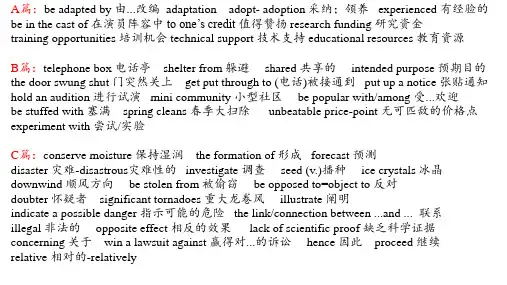
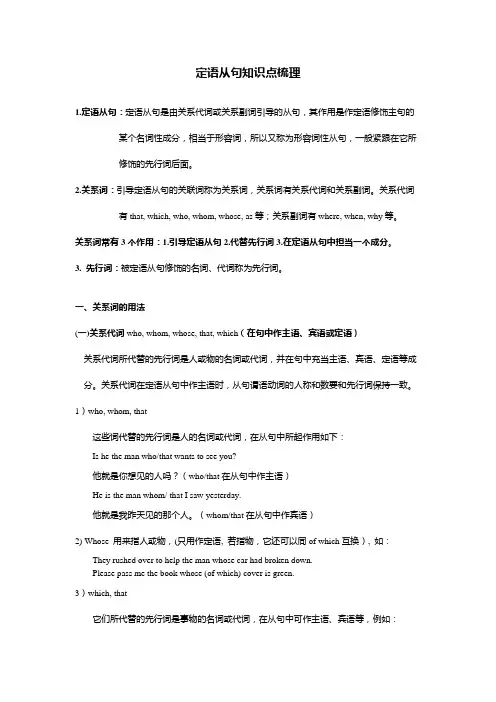
定语从句知识点梳理1.定语从句:定语从句是由关系代词或关系副词引导的从句,其作用是作定语修饰主句的某个名词性成分,相当于形容词,所以又称为形容词性从句,一般紧跟在它所修饰的先行词后面。
2.关系词:引导定语从句的关联词称为关系词,关系词有关系代词和关系副词。
关系代词有that, which, who, whom, whose, as等;关系副词有where, when, why等。
关系词常有3个作用:1.引导定语从句2.代替先行词3.在定语从句中担当一个成分。
3. 先行词:被定语从句修饰的名词、代词称为先行词。
一、关系词的用法(一)关系代词who, whom, whose, that, which(在句中作主语、宾语或定语)关系代词所代替的先行词是人或物的名词或代词,并在句中充当主语、宾语、定语等成分。
关系代词在定语从句中作主语时,从句谓语动词的人称和数要和先行词保持一致。
1)who, whom, that这些词代替的先行词是人的名词或代词,在从句中所起作用如下:Is he the man who/that wants to see you?他就是你想见的人吗?(who/that在从句中作主语)He is the man whom/ that I saw yesterday.他就是我昨天见的那个人。
(whom/that在从句中作宾语)2) Whose 用来指人或物,(只用作定语, 若指物,它还可以同of which互换), 如:They rushed over to help the man whose car had broken down.Please pass me the book whose (of which) cover is green.3)which, that它们所代替的先行词是事物的名词或代词,在从句中可作主语、宾语等,例如:A prosperity which / that had never been seen before appears in the countryside.The package (which / that) you are carrying is about to come unwrapped.4) asAs用于先行词前有as, so, such, the same修饰的限制性定语从句.You can take as many books as you need.(二) 关系副词when, where, why(在句中作状语)1. when指时间,在定语从句中做时间状语(1) I still remember the day when I first came to the school.(2) The time when we got together finally came.2. where指地点,在定语从句中做地点状语(1) Shanghai is the city where I was born.(2) The house where I lived ten years ago has been pulled down.3. why指原因,在定语从句中做原因状语(1) Please tell me the reason why you missed the plane.(2) I don’t know the reason why he looks unhappy today.注意:关系副词引导的从句可以由“介词+关系代词”引导的从句替换(1) The reason why/ for which he refused the invitation is not clear,(2) From the year when/in which he was going to school he began to know what he wanted when hegrew up.注意:介词+关系代词引导的定语从句关系代词在定语从句中做介词宾语时1. 含有介词的动词短语一般不拆开使用,如:look for, look after, take care of等(1) This is the watch which/that I am looking for. (T)(2) This is the watch for which I am looking. (F)2. 若介词放在关系代词前,关系代词指人时用whom,不可用who或者that;指物时用which,不能用that;关系代词是所有格时用whose(1) The man with whom you talked is my friend. (T)(2) The man with that you talked is my friend. (F)3. “介词+关系代词”前可有some, any, none, both, all, neither, most, each, few等代词或者数词(1) He loved his parents deeply, both of whom are very kind to him.(2) In the basket there are quite many apples, some of which have gone bad.4. 介词后面的关系词不能省略。
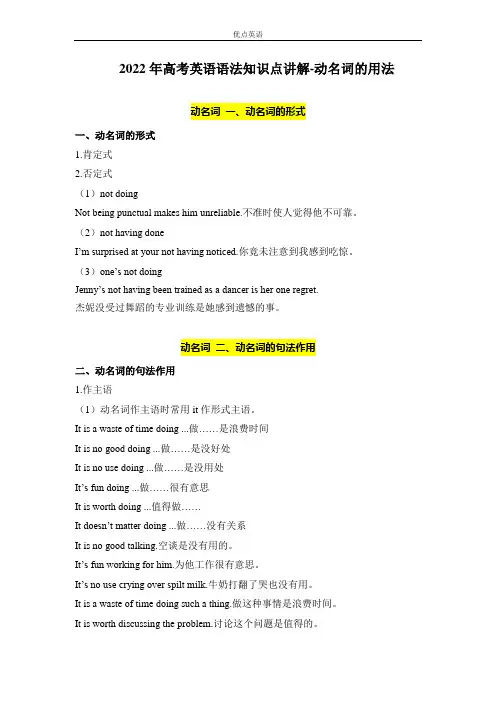
2022年高考英语语法知识点讲解-动名词的用法动名词一、动名词的形式一、动名词的形式1.肯定式2.否定式(1)not doingNot being punctual makes him unreliable.不准时使人觉得他不可靠。
(2)not having doneI’m surprised at your not having noticed.你竟未注意到我感到吃惊。
(3)one’s not doingJenny’s not having been trained as a dancer is her one regret.杰妮没受过舞蹈的专业训练是她感到遗憾的事。
动名词二、动名词的句法作用二、动名词的句法作用1.作主语(1)动名词作主语时常用it作形式主语。
It is a waste of time doing ...做……是浪费时间It is no good doing ...做……是没好处It is no use doing ...做……是没用处It’s fun doing ...做……很有意思It is worth doing ...值得做……It doesn’t matter doing ...做……没有关系It is no good talking.空谈是没有用的。
It’s fun working for him.为他工作很有意思。
It’s no use crying over spilt milk.牛奶打翻了哭也没有用。
It is a waste of time doing such a thing.做这种事情是浪费时间。
It is worth discussing the problem.讨论这个问题是值得的。
It doesn’t matter wasting a little money.浪费一点钱没有关系。
【比较】①It was nice meeting you.见到你真高兴!(用于分别时)②It is nice to meet you.(用于刚刚见面时)(2)“There is no doing sth.” 句式中作主语,意为“不可能……,无法……”There’s no denying the fact.这一事实不容否认。
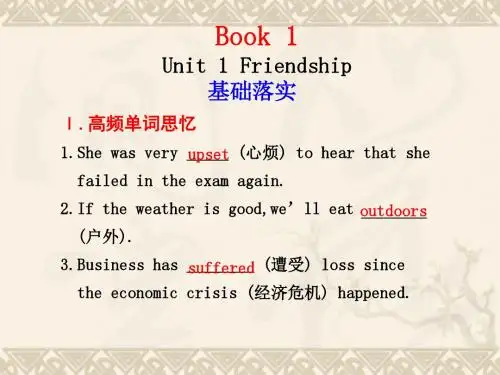
2022年高考英语语法知识点讲解-现在分词的用法现在分词一、现在分词的形式一、现在分词的形式1.肯定式2.否定式(1)not doingHe stood helpless,not knowing what to do.他无可奈何地站在那里,不知如何是好。
(2)not having doneNot having done it right,I tried it again.因为没做对,我又试了一次。
二、现在分词的句法作用二、现在分词的句法作用1.作定语What disappointing news!多么令人失望的消息!The story had a satisfying ending.这故事有一个令人满意的结局。
The man standing by the window will give us a report.站在窗口的那人将给我们做报告。
There is a gentleman asking to see you.有一位先生要求见你。
【提示】单个的分词作定语时常置于被修饰词的前面,但分词短语作定语时要后置。
2.作表语amazing 令人惊异的astonishing 令人惊讶的disappointing 令人失望的exciting 令人激动的frightening 令人恐惧的interesting 令人感兴趣的moving 动人的relaxing 使人放松的shocking 令人震惊的surprising 令人惊讶的worrying 令人担忧的puzzling 使人迷惑的This book is quite interesting.这本书很有趣。
The news is encouraging.这消息令人鼓舞。
3.作宾语补足语(1)作及物动词的宾语补足语用现在分词作宾补的动词:bring 引起catch 碰上(撞上)discover 发现feel 感觉find 发现get 使have 使hear 听见keep 使leave 听任listen to 听着look at 看着notice 注意到observe 观察see 看见send 使(突然做某事)set 引起(做某事)start 使(开始做某事)watch 观看His letter left me feeling pretty humble.他的信使我感到自己很卑微。
2024届高三英语高考一轮复习语法考点连词as知识点总结(讲义)高三英语教研室整理as与短语as的用法非常之多,但是可以分成两大类:与短语连用和与句子连用。
as + 短语——作为as + 句子——原因、正如、时间状语、伴随、转折(倒装标志)从上面的用法列表里可以看出,as和短语连用的概念非常直接,表示“作为”的含义,可以用来描述人物的身份地位或事物的性质功能。
人物的身份和地位I received it during the first June I faced as a widow to raise two teenage daughters alone.我在作为寡妇所面对的第一个六月收到了它,那时我要独自抚养两个女儿。
Days later, I got a job as a summer camp counselor.数天之后,我得到了一份工作,作为一名夏令营的辅导员。
I think I have a position for you as a teacher's assistant.我想我有一个职位给你,作为一名助教。
事物的性质和功能She brought a toy bear to me as a present and told me about her college life.她买了一个玩具熊给我当作礼物,并且给我讲述了她的大学生活。
With a pleasant smile, she told me Jimmy brought them to her as a "get-well gift".她面带微笑的告诉我Jimmy给她带来了这些作为“康复礼物”。
我们曾经见过许多和as在一起使用的动词,构成“v + as”这样的短语,其实as的作用是一模一样的。
My mom, acting as a peacemaker, would slowly enter and sit next to me on the bed.我的母亲,扮演一名调停者的角色,就会慢慢的走进我的房间并且坐在我的床边。
高三英语第一轮复习知识点高三英语第一轮复习知识点1impressionn.印痕;印记;印象;感想常用结构:haveanimpressionofsth./doingsth.对(做)某事有印象makeanimpressiononsb.给某人留下印象makenoimpressionon对……无影响/效果givesb.afavorableimpression给某人留下好印象animpressionofone’sfoot某人的脚印Yourperformancegavemeastrongimpression.你的表演给我留下了很深的印象。
WhatIsaidmadenoimpressiononhim.我的话对他不起作用。
联想拓展impressv.留下印象impresssth.on/uponone’smind把……牢记在心上lackv.&n.缺乏;缺少的东西注意:lack作名词时,后常接of。
lack作动词时,既可作及物动词,也可以作不及物动词,作不及物动词时,后常接for或in。
lack不用于被动语态。
常用结构:lacksth.缺少某物lackforsth.缺少;需要for/throughlackof...因缺乏……nolackof...不缺乏a/thelackof的缺乏Hedidn’tgotherebecausehelackedcourage.他没去那里,因为他缺乏勇气。
Theplantdiedforlackofwater.植物因缺水而死。
Theylackedfornothing.他们无所需求。
联想拓展lackingadj.匮乏的;不足的;没有的belackingin缺乏(品质、特点等)sightn.视力;视觉;看见;光景,奇观;名胜常用结构:losesightof看不见;忘记;失去catchsightofsth./sb.看见某物/人atfirstsight初看之下;乍看起来at(the)sightof一看见就……outofsight看不见beinsight看得见,在眼前Outofsight,outofmind.眼不见,心不烦。
冠词●考点分析:冠词是重要的虚词之一,是高考必考的知识点,通常以单项选择题的形式出现。
涉及的知识点包括过不定冠词、定冠词和零冠词三方面的具体用法。
冠词只有三种形式但是冠词的内涵丰富,用法灵活,最能体现英语独特的形式特征,又极易给中国考生带来麻烦。
题目的设置主要考查的是冠词的一些最基本的用法每年单选试题中均有一道关于冠词知识的考查。
●考点核心知识梳理·概括(专题知识构建)冠词的习惯用法(一)不定冠词的重要用法1.表示身份、职业不定冠词用于单数可数名词前表示身份、职业,尤其用在作表语或宾语补足语的名词前。
She is a high school teacher.Her name is Li Fang.她是一位中学教师,名叫李芳。
The Whites wanted their daughter to be a musician.怀特夫妇想要他们的女儿成为音乐家。
注意:独一无二的职位名词在句中做表语,补语和同位语时,一般不用冠词,但是如果做了句子的主语或是宾语时候,要在前面加冠词。
He is captain of the team.他是球队队长。
Zhang Fei,monitor of their class,is good at English.张飞是他们的班长,英语很棒。
2.表示“同一”,相当于the same。
即:be + of + a/an+n= be + of + the same+n 如:The two boys are of an age.那两个男孩同岁。
Cotton of a kind was stored together in a house.同类的棉花储藏在一座房子里。
3.不定冠词用在表示数量、长度、时间等的计数单位的名词前,表示“每一”。
如:We have three meals a day.我们每天吃三顿饭。
They met each other once a month.他们每月会面一次。
高三英语一轮知识点回归课本总复习Book 1 Unit 1---3词汇与短语:1. hunt for 搜索, 追寻2. care about 担心, 关心3. such as 例如4. drop sb. a line 给某人写信5. be fond of 喜欢6. in order to 为了7. all the time 一直8. argue with sb. about sth. 同某人争论某事9. all alone 独自10. develop a friendship with sb. 和某人建立友谊11. even though 即使, 尽管12. treat …as 把…当作13. surf the Internet 上网冲浪14. on a flight 在飞行中15. too much太多16. should have done 本应当做某事17. be into sth./ doing sth. 喜欢18. be quick in/ at 在某方面敏捷19. make oneself at home 别客气20. in total 总共21. except for 除了…之外22. stay up 熬夜23. come about 发生24. end up with以…告终25. bring in 引进,引来26. a great many 许多27. all the way 一路上,从头至尾28. communicate with 与…交流29. have a good knowledge of 了解,掌握30. with 复合结构31. compare… with… 把…和…进行比较32. share happiness and sorrow 同甘共苦33. It be + 被强调部分+ that/ who + 其他成分34. stay the same 保持不变35. more or less 或多或少36. consider doing/sb. to do/ sb,. (to be)37. get away from 逃离38. watch out注意,当心39. instead of代替40. go off 离开41. protect from 保护,保卫42. for fun好玩知识点归纳:1.argue(vi.﹠vt.): express an opposite opinion;exchange angry words;quarrel 争论,争辩常用于以下句型:argue with sb. about/ over sth 同某人争论某事argue th at…用辩论证明argue sb. to be 表明,证明argue for/ against为/为反对…而辩论例句:⑴The couple next door are always arguing. 隔壁的夫妇总是争吵⑵We argued with each other about the justice of the war.我们就这场战争是否正当展开了争论⑶Mr.Smith argued that he should be paid more.史密斯先生据理力争他应得到更多的工薪⑷The way he spends money argues him to be rich.他花钱的方式说明他很富有⑸His accent argues him to be a southerner.他的口音表明他是个南方人⑹He argues that the experiment could be done in another way.他论证说这项实验可以换一种方法进行⑺The workers argued for the right to strike.工人们为争取罢工的权利而辩论* argument(n.) 争论,论据,论点⑴They got into quite a heated argument.他们的争论达到了白热化。
⑵We couldn’t follow his argument.我们不理解他的论点。
2.too much 具有形容词、副词和代词的功能,在句中可作定语、表语、状语、主语或宾语,表示“太多(的)、过分(的)、好极(的)”意思⑴But too much snow can cause trouble.但是雪太大可能引起麻烦(too much为形容词,作定语)⑵She is afraid the trip will be too much for me.她认为这次旅行对我来说强人所难(too much为形容词,作表语)⑶She does not talk too much.她谈得不太多(too much为副词,作状语)⑷Too much has been said about it.关于这事讲得太多了(too much为代词,作主语)辨析:much too “太…”,中心词是副词too,用来修饰形容词和副词,在句中作状语⑴These shoes are much too narrow for me.这双鞋我穿实在太窄了⑵You are much too thin to play the part of Falstaff.你太瘦了,不能演福尔塔夫这个角色高考题例:Allen had to call a taxi because the box was _____ to carry all the way home.(NMET2003)A. much too heavyB. too much heavyC. heavy too muchD. too heavy much分析:heavy为形容词,故应用much too修饰答案:A3. in order to do sth.so as to do sthto do sth它们都可作目的状语,其区别如下:* 这三种不定式作目的状语,在意义上并无多大差别,相比而言,to do 比较普遍,后两种在语气上稍重些,而so as to do 比较口语化,in order to do则比较正式* 为了加强语势,突出目的,可将to do 或in order to do放在句首。
注:so as to do 不能放在全句的前面,它只能后置⑴China is paying more and more attention to education in order to/so as to/to catch up with advanced countries in science and technology.中国对教育越来越重视,为的是科技上赶上发达国家⑵In order to find the book, he searched the whole house.为了找到那本书,他翻遍了整个房子⑶To hear better, we’ll sit in the front row.为了听得更清楚,我们要坐在前排* to do, in order to do 和so as to do 三种不定式作目的状语时, 一般句子的主语就是不定式的逻辑主语, 但如果不定式的逻辑主语不是句子的主语,常用for引出:eg.I stopped aside for her to get in.我停下来向旁边靠了靠,让她进来* 不定式作目的状语表达否定的目的时,一般采用so as not to或in order not to 这两种句式。
如:⑴We took a taxi so as not to be late.我们是搭出租车去的,以免迟到⑵He worked slowly in order not to make any mistake.他工作干的很慢,目的是不出错⑶I got up early so as not to miss the first train.我大清早起床,目的是不误第一班火车4. treat vt. 对待,治疗,款待常用于以下句型:treat…as…把…看作treat sb. to sth.用…款待某人treat sb. for… 给某人治…病eg.⑴Don’t treat me as a child. 不要把我当成小孩看待⑵Why do you treat the matter as a joke?你为什么把这件事当作儿戏⑶Peter treated me to an ice-cream. 彼得请我吃了冰激凌⑷The doctors and the nurses risked their lives treating the patient for SARS. 医生和护士冒着生命危险为患者治疗非典* 以下句型也常用来表示“把…当作”:look on/ upon …as…have…as…think of…as/ to be…consider …as/ to be…regard… as…eg.⑴They look on others’ difficulties as their own. 他们把别人的困难当成自己的困难⑵She thinks of the monitor as the cleverest student in the class. 她认为班长是班上最聪明的学生⑶He always has her as his real mother.他一直把她当作自己的母亲⑷Abraham Lincoln is considered as one of the greatest American President.亚伯拉罕林肯被认为是美国最伟大的总统之一⑸All the patients regard him as a good doctor.所有的病人都认为他是一名出色的医生高考题例:More patients___ in hospital this year than last year.(2004江苏高考)A. treatedB. have treatedC. had been treatedD. have been treated分析:根据句意, “treat”的意思是“治疗”,而且是发生在今年,故用现在完成时态的被动式答案: D5. share vt. ﹠vi. 分享,共用,等分share (in) sth. with sb.⑴The children shared the cake equally.孩子们平分了蛋糕⑵Ten teachers shared the office.十名教师合用这间办公室⑶They would share their joys and sorrows.他们愿意同甘共苦⑷Will you share your umbrella with me?你能让我和你共用雨伞吗?⑸I’ll share in the cost w ith you.我愿意和你分担费用* share n. 份额,股份,一份⑴If you want a share of the pay, you’ll have do your share of the work.如果你想要一份报酬,就必须做一份工作⑵The company was formed with 1,000 shares.这家公司组成时有1000股⑶Here is your share of the cake.这是你的一份蛋糕高考题例:Let Harry play with your toys as well, Clare----you must learn to _____.(NMET2000)A. supportB. careC. spareD. share分析:“as well”是“也”的意思,据题意,是让“Clare”和“Harry”两个人一起玩玩具,“share”有分享、共用的意思。